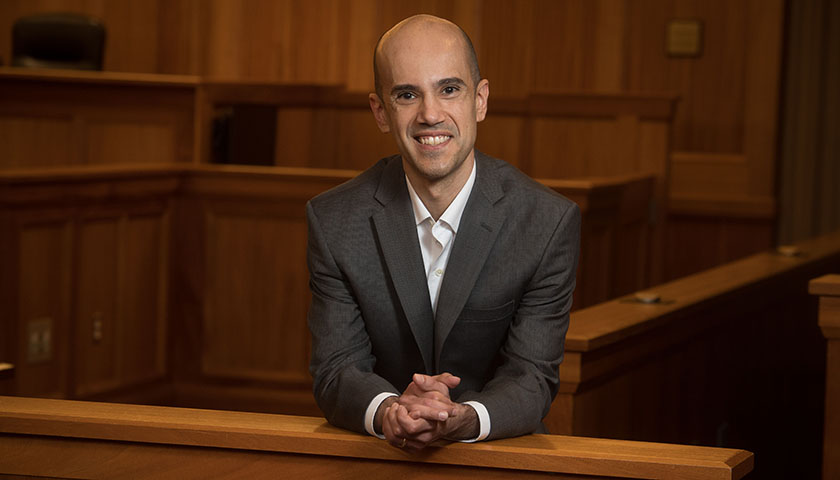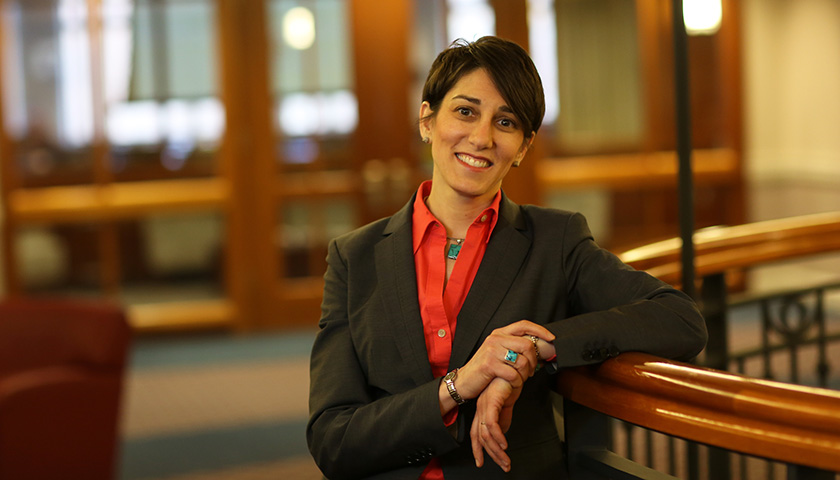Professor René Reyes weighs in on civil rights in the context of religious objections to same-sex marriage. Clinical Professor Sarah Boonin assesses the meaning of marriage equality.
In the 2020 edition of the Stanford Journal of Civil Rights & Civil Liberties, Professor Reyes looked at two recent cases, one in the U.S. and one in the U.K., in which same-sex couples argued that their civil rights were violated when a bakery refused to provide a cake because of the owners’ religious objections to same-sex marriage.

In the U.S. case, Masterpiece Cakeshop, Ltd. v. Colorado Civil Rights Commission, the Supreme Court made a narrow decision in favor of the bakery owner. Justice Anthony M. Kennedy’s majority opinion argued that the Colorado Civil Rights Commission, which had ruled against the baker, had evidenced hostility to religion because of the remarks of one of its members. “The court passed on an opportunity to either bolster the right to same-sex marriage or explain how far the government can go in regulating businesses run on religious principles,” wrote the New York Times.
Reyes writes in the paper’s abstract:
“The Supreme Court’s decision in Masterpiece Cakeshop, Ltd. v. Colorado Civil Rights Commission has been roundly criticized for its failure to engage with difficult questions of constitutional law and for its absence of analytical clarity. While the Court reiterated that states have the authority to prohibit discrimination on the basis of sexual orientation, the Court also held that states must treat religious objectors’ claims with an ill-defined degree of neutrality and respect under the Free Exercise Clause. The combination of the majority opinion’s analytical shortcomings and Justice Kennedy’s departure from the bench has left the doctrinal landscape in a state of uncertainty, even as controversies between service providers and same-sex couples continue to arise.
"But Masterpiece Cakeshop is not the only recent high court case that can provide insights into how to resolve tensions between religious liberty and anti-discrimination principles. In 2018, the U.K. Supreme Court decided Lee v. Ashers Baking Company Ltd., which similarly arose out of a shop’s refusal to provide a cake to a customer because of the owners’ religious objections to same-sex marriage. Like its American counterpart, the British Supreme Court reversed the decisions of lower tribunals and ruled in favor of the bakery. Yet despite these commonalities, there are important differences between the two cases. Most notably, the analysis in Ashers Baking Company improves upon the analysis in Masterpiece Cakeshop by drawing sharper distinctions between permissible and impermissible refusals to serve patrons, and by providing clearer indications that respect for freedoms of speech and religion need not imperil the viability of laws prohibiting discrimination. Ashers Baking Company thus has the potential to enrich the ongoing process of resolving the doctrinal uncertainty that persists under American constitutional law, and to highlight the benefits of transatlantic dialogue regarding questions of liberty and equality.”
What motivated Professor Reyes to write the article?
“One of the things I try to do in my teaching and scholarship is to highlight the extent to which the American constitutional tradition fails to promote equality,” Reyes says.
“With respect to the Masterpiece Cakeshop case, I believe that it’s important to find ways to honor the rights of vendors to exercise their religious and expressive freedoms without undermining the rights of LGBTQ+ patrons to receive equal treatment in the marketplace. The comparative perspective that I adopt in my article helps us to see that it’s possible to accomplish both of those goals in a principled manner that respects liberty and equality alike.”

“I Do, Now What?”
In her article in Ms. Magazine, “I do! Now What?” Clinical Professor Sarah Boonin looks at the meaning of the Obergefell v. Hodges case. In the 5–4 decision the Supreme Court held that the Fourteenth Amendment requires all states to grant same-sex marriages and recognize same-sex marriages granted in other states.
Boonin wrote in Ms.: “With Obergefell, the time was right. And Kennedy’s ruling may well be remembered as much for its aspirational prose as for its legal conclusions. Writing for himself and the court’s four liberal justices, he based the opinion on the legal recognition that marriage is a 'fundamental right'— an interest so important to a person’s liberty that the state may not infringe upon it. Kennedy describes marriage as a personal choice 'central to individual dignity and autonomy,' and one that 'define[s] personal identity and beliefs.' This part of the opinion draws on the long history of reproductive-rights jurisprudence that helped define constitutionally protected spheres of privacy.
“Yet his opinion wasn’t just about the singular importance of marriage (an argument that could have rendered marriage equality a stand-alone victory for gays and lesbians). Embedded throughout Kennedy’s almost poetic language is another core theme: that gay and lesbian individuals are entitled to equal treatment under the law. It is no coincidence that the penultimate sentence of his opinion trumpets the constitutional guarantee of 'equal dignity in the eyes of the law' for same-sex couples. These and other passages recognizing marriage discrimination as a matter of inequality may hold the promise of future LGBT rights.”
What motivated Professor Boonin to write the article?
"I chose to write about the issue of marriage equality because it has personally affected my family and my community of friends. I was first directly impacted by the prohibition against same sex marriage during the summer after my 1L year in law school, when I became engaged to my now-wife. We remained unable to legally marry for several years. We were married shortly after Massachusetts recognized same-sex marriage, but continued to be impacted by the Defense of Marriage Act (DOMA) because my wife is a long-time federal employee.
"For years we filed numerous duplicative and 'shadow' state and federal tax returns and carried two family health plans because I was unable to be covered on her insurance. (I have a chronic health condition that necessitated I have coverage.) I could not be a beneficiary on her retirement plan; she could not take FMLA [Federal Medical Leave Act] to care for me, etc. We went through careful and specialized estate planning to ensure our relationship would be recognized to the extent possible.
"After the birth of our daughter, we had to go through a second parent adoption process that was unnecessary and demeaning, all to ensure we both had full parental rights. After SCOTUS dismantled DOMA, we continued to be impacted by the unequal treatment of marriages in the various states when traveling out of Massachusetts with our family. A trip out of state could legally erase our relationship.
"Even since SCOTUS extended the right to same-sex marriage to all states, marriage inequality (and far more draconian prohibitions on queer rights) continue to be a challenge for our family when traveling, especially abroad.
"Like many queer families we know, we always travel with adoption papers, health care proxies and durable powers of attorney, etc. We do not travel to any country that criminalizes sexual or gender identity, or oppresses queer people."



